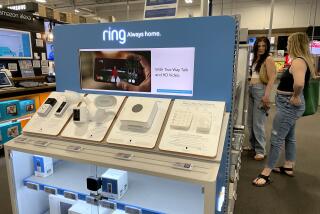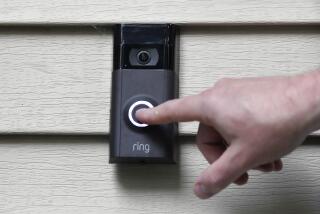Suffering From Palm Envy
- Share via
With a steady stream of new technological products constantly hitting the market, Rob Rutter’s jealousy is raging.
A co-worker bought a Palm VII personal digital assistant.
“It’s the coolest gadget. I want one,” Rutter said.
Another colleague brought in a cell phone with Web access.
“I am hopeless to resist it.”
Worse, his brother had Sony’s Surround Sound installed at his home.
“I want it,” Rutter said instantly.
The 31-year-old Rutter, a manager at Internet content provider Akamai Technologies, suffers from chronic tech envy. Over and over again, he finds himself envious when friends, siblings or co-workers display their new cutting-edge toys.
He has plenty of company. All over the world, consumers like Rutter have become pawns in the technology frenzy game. Buy a new laptop computer, and the person in the next pod walks in with one that is twice as thin. Cell phones keep getting smaller and are being transformed into mini-computers. New generations of Palms are released every couple of months, with cool new colors and attachments. And forget premium cable, now there’s high-definition television, satellite television and TiVo, a service that lets you pause, rewind and fast-forward live TV shows as though they were on videotape.
Granted, the envy for technology devices is different from the urge to own, say, a Ferrari, a beachfront Malibu home or a Van Gogh. Those items are out of reach for most people. But tech gadgets are within the impulse-buying price range of the middle class, and they usually can be acquired the same day.
William Crano, a psychology professor at Claremont Graduate University, said most people are envious because humans naturally act in ways that promote their well-being.
“It serves your own self-interest not to get behind the curve,” Crano said. “Any time you have a deal where it says, ‘Be the first on your block to get this,’ it appeals to the deadly beast that lies within everyone.”
Envy becomes even more powerful when it’s not possible for someone to get the latest gizmo. That problem has been exacerbated this year by a shortage of parts that has put some of the most popular new gadgets--the Sony PlayStation 2 and the Compaq iPaq hand-held computer, for instance--in short supply.
“Part of the way you get people to want something is to suggest it is scarce,” Crano said. “That drives envy.”
Envy has long been a cornerstone of marketing, and few employ it better than the technology industry. Spending on marketing products such as computers, cell phones and personal digital assistants is up nearly 50% from a year ago, to $426 million through June, according to the Prince Group, a Manhattan firm.
Candace Corlett, a partner in the New York consulting firm WSL Strategic Retail, said Palm Inc. in particular has done a great job on marketing by regularly introducing new models with the latest gizmos and colors.
“It’s the tweaking that stirs the envy,” Corlett said. “It’s a very real marketing strategy that speaks to the need to be better than the Joneses.”
Consumers are particularly vulnerable when it comes to wireless products, said David Stewart, a USC marketing professor who specializes in consumer behavior.
“The reality is that wireless products are quite visible technologies,” Stewart said. “These products, cell phones and personal digital assistants, are used in public places.”
The classic example of such behavior was the frenzy in Japan after the Sony Walkman was introduced.
The most common place for tech envy to sprout is at work. E Talent Agency, a Los Angeles company that finds creative professionals to work at online companies, experienced a case of Palm envy earlier this year. After seeing a co-worker’s new Palm, Vicki Whicker, an account executive, bought one the next day. Two days later, Leslie Berliant, the company’s general manager, had to have one.
“All in a week,” Berliant said.
But to Berliant, her Palm purchase was not just about envy. It was also about practicality. She knew after seeing the Palm demonstrated that she would use it often. Berliant now uses her Palm IIIe to store phone numbers and addresses and as a date planner. It also serves as her calculator and a way to track expenses. She may be getting ready for an upgrade.
“I would use it a lot more if I had wireless e-mail,” Berliant said.
However, she is more inclined to wait until somebody can deliver her an all-in-one device.
“I only buy the stuff that I think is going to make my life easier,” Berliant said.
For Rutter, the Akamai Technologies manager, the solution is a sort of technological abstinence. He and his wife are expecting their first child in March, and she is putting the brakes on his gizmo spending.
“If it weren’t for my wife, I’d be broke,” he said. Some think men are more susceptible to tech envy than women. The only time Kim Silha experienced tech jealousy was when her husband was ogling her slim new laptop computer issued by her employer, Tellsoft Laboratories, a Colorado Springs, Colo., Web software firm. “It made him envious,” Silha said. “But I wouldn’t care if he had a better laptop. If a woman came in the office wearing a nice pair of shoes, I’d rather buy those.”
And some have learned hard, if not good, lessons from coveting thy neighbors’ gadgets.
Neena Rao, a manager at Evoke Communications, a Manhattan Beach Web content provider, bought a Motorola StarTAC 7000 cell phone after a co-worker showed off his at the office. But the phone turned out to be a dud. It often shut down without any warning, and the model ended up being recalled.
The same co-worker recently came into work with a new $3,500 Sony Vaio, one of the slimmest of the slim new laptops that weighs 2.7 pounds compared with 6 or 7 pounds for typical laptop computers. The proximity of the seductive Vaio had Rao reeling. “By week two, I was thinking, ‘OK, that’s worth the money,’ ” Rao said.
But some “less techno-geek friends” talked her out of the purchase, reminding her of the high-tech phone the same co-worker had talked her into buying.
At Los Angeles-based Trafficstation.com, which provides real-time Internet traffic reports, Christopher Fording is the techno-addict star. He doesn’t envy anyone. Everyone envies him.
“People tend to come to me. I’m the resident expert,” said Fording, 30, who showcases the company’s Web site at trade shows and special events. He is constantly lobbying the company to let him buy new high-tech toys in order to show off Trafficstation.com more effectively.
“He keeps wanting to spend my budget on the latest thing,” said his boss, marketing director Keith Friedenberg. “You can never keep up. It’s a weird mixture of function and hype.”
Trafficstation.com has been willing to buy nearly all the products he has requested, including the Sony Vaio. But the company has drawn the line at paying above retail price.
Currently, Fording wants a Compaq iPaq, which sells for $499. But it is so hot that Compaq has not been able to fill his order. Fording found an iPaq on EBay for $700, but Friedenberg said no.
“We won’t go above the retail price. It’s getting too insane,” Friedenberg said.






